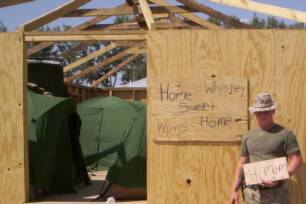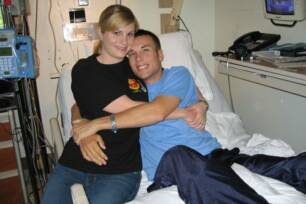FOR MORE INFORMATION:
_________________________________________________________________________
What wounded warrior families wish you understood...
Cheryl Gansner, completed her degree in Social Work while her husband was on his third tour overseas. Bryan and Cheryl were married four months before his final deployment to Iraq. He was injured only six weeks before returning home. Cheryl now works as the Program Coordinator for Operation Homefront’s Wounded Warrior Wives Program. If you are a female caregiver of a wounded, ill or injured service member or veteran please check out the Wounded Warrior Wives Program at www.operationhomefront.net
________________________________________________________________
Cheryl and Bryan's Story
My husband, Bryan Gansner, was severely injured July 28th, 2006 by an improvised explosive device in Kirkuk, Iraq. We spent a solid year at Walter Reed Army Medical Center rehabilitating his wounds. Then we spent another eight months after that driving back and forth to Walter Reed to complete his medical boards. It was quite the roller coaster going through surgeries and unending doctor’s appointments to get him back in somewhat working condition.
While living at Walter Reed we had many kind people reach out to us.
- They offered to bring us meals,
- they let us borrow their furniture since we had to move off post and our things were in storage,
- they took us places when we didn’t have any transportation,
- sent us gift cards for food as the hospital wasn’t open longer hours for us to eat,
- and offered a listening ear.
- We have so many cards from complete strangers that I still cherish to this day. I kept every single card to remind me of how many people cared about us and his sacrifice.
All of these things truly helped us survive the rehabilitation process. Being removed from our home and friends and being transplanted in DC was very challenging. We knew no one; I had no one to help me take care of Bryan, and all we had were our clothes that were shipped to us. It was nice for others to open up their home to us and feed us a nice meal.
While people have been very helpful there have been handfuls that were hurtful.
- The stares were really hard for my husband to take. He had to be pushed in a wheelchair and his legs were casted for a long time.
- We had people say very ugly things to us as I pushed him. One lady asked her friend” what kind of idiot breaks both of his legs.” We would rather someone ask what happened to him rather than making judgments on how he was hurt.
- Bryan was always willing to tell his story to those that were interested in what happened to him. Now that we are five years down the road of recovery we might share with people what happened to him, the worst thing someone could say is “well he looks like he is OK.”
- We still struggle with his injuries every single day. He might look better, he tries to walk without a limp and he tries to hide his PTSD, but it all still there.
What I wish people would understand that if the war is winding down the war at home is not.
- We are in a new generation of wounded warriors and they will face challenges for the rest of their lives, just like previous wars.
- I wish people understood that once they get done with their initial recovery and are in to the VA system it becomes very isolating. We felt so alone once we moved back to my home state. We started over in a new city where we knew no one. It was hard for my husband to make friends as he feels he doesn’t fit in with civilians.
- Don’t forget the spouse or caregiver of the wounded warrior either. They are trying to take care of all the paperwork, appointments, medication management, providing safety, therapies, and they try to find time to take themselves to the doctor.
- If you know of a wounded warrior in your town try to find a way to help them out or include them. It is hard enough adjusting when you come home off a deployment but the challenges are amplified when injuries come in to play.
We would appreciate prayers for continued recovery. While we are in a much better place than we were even two years ago we could still have another surgery or set back at any time. We also want the ability to put his injury in the back of our minds instead of the forefront. We are ready to move on and help others.
Photo courtesy of Cheryl Gansner
Insights in caring
Wounded Warriors
Copyright 2008 - 2022 Benita Koeman, Operation We Are Here. All rights reserved.
Operation We Are Here is a HUB of RESOURCES for the military community and military supporters.
Military support is not a concept to embrace; military support is sacrificial action. Visit our military support TOOLKIT.
Resources for supporters of military and veteran families
- Practical insights in caring for
Military and veteran family resources
- Christian encouragement
- Deployment support for
- Downloads and printables
Operation We Are Here
Follow us on
resources


